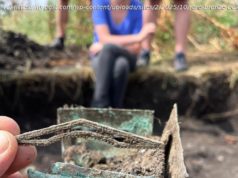Don Henley hinted at a « last dance » at the inaugural Classic West concert featuring The Eagles, Steely Dan, and Doobie Brothers headlining.
Were fans at the inaugural Classic West festival at Dodger Stadium seeing the Eagles’ local last hurrah Saturday night? Don Henley, who’ d be first to admit he’s made false prophecies about afterlives and temperatures before, wasn’ t predicting one way or another, but he did strongly hint that there might not be a future for the band after they play the counterpart Classic East fest in New York later this month. “In case this is our last dance, I want to thank all our fans in southern California, ” Henley told the full house. “It all started right here in Los Angeles 46 years ago… Who knew?”
But if this was a test run for whether a post-Glenn Frey version of the Eagles could pass muster, it augured well on that front, thanks to some smart choices about fill-ins for the late co-frontman. The most obvious live ringer was Frey’s 24-year-old son, Deacon, who was wearing a Dodgers jersey laden with meaning beyond just a mere nod to the concert’s Chavez Ravine setting. It was a Kenley Jansen jersey, honoring the Dodger who is arguably the top bullpen pitcher in baseball right now — a choice that hardly seemed coincidental, since Deacon was acting as a reliever of sorts for his dad in for the Eagles’ first full concert since Glenn’s 2015 passing, along with fellow closers Vince Gill and (for just one song) Bob Seger.
Timothy B. Schmit on First Eagles Show Without Glenn Frey: Son Deacon ‘Up to the Task’
It was the night of a thousand fill-ins, seemingly, as not only the Eagles but middle-billed Steely Dan were faced with doing a show without half of the original dynamic duo. Early on in Steely Dan’s set, attendees might have been wondering if co-leader Walter Becker had shaved his head since last year’s Hollywood Bowl show, only to finally have Donald Fagen explain that Becker “took ill [just] before he was supposed to come to L.A.” and offer a “wish for a speedy recovery.” In Becker’s place was legendary guitarist Larry Carlton, who’ d played the solos on some seminal Steely Dan recordings like “Kid Charlemagne.”
Here, as with the Eagles’ set, there was the bittersweet sense of an unfortunate absence resulting in a possibly one-of-a-kind show rife with different chemistry and creativity. Sometimes, mortality truly is the mother of invention.
In some key ways, Saturday night’s set was much like a typical Eagles show from before Frey’s passing, with pretty much the same chestnuts performed (minus a few very early album cuts that’ d been added to the “History of the Eagles” tour) . Every Eagles concert may end with “Desperado, ” but the half-hour before that will always see the group turning into the Joe Walsh Band, with even Henley well realizing that non-Eagles picks like “Rocky Mountain Way, ” “Funk #49, ” and “Life’s Been Good” and Walsh’s solos on “Life in the Fast Lane” and “Hotel California” outdo weightier fare like “The Best of My Love” as the kind of fireworks that send the fans in the top deck home happy.
Dodgers Owner Mark Walter Pegged as Record-Setting Buyer of David Geffen’s Malibu Compound
But for aficionados of deep tracks, there was a unique addition to the Dodger Stadium show, one that Henley maybe felt he couldn’ t forego if this really could be the Eagles’ last waltz in L.A. That was the “Hotel California” album closer “The Last Resort, ” one of the finest pieces of writing from one of rock’s best lyricists, although, as Henley noted, “We never did it much back in the day.” (Indeed, setlists.fm has this show down as possibly only the seventh time the Eagles ever played it in a regular concert setting, not counting the “Hell Freezes Over” sessions.) “It requires some personnel. But we brought some personnel, ” Henley further explained, a nod to a five-piece string section enlisted specifically for “Resort” on top of the horns that adorned a few other numbers. A meditation on land grabs, religion, and the California dream, “The Last Resort” is even more elegiac now than it was in 1976, whether it now put you in mind of global warming or the recent passing of a certain California dreamer.
It was to Deacon Frey, however, to get elegiac on a more profoundly prosaic level: “Anyone out there miss my dad?” he asked. His father was, of course, the real star of this particular show, as evidenced by the remaining band’s choice to employ three substitutes in his stead.
Seger was the surprise of the evening, brought out for “Heartache Tonight, ” the barn-burner on which he is co-credited as a writer. (Henley mentioned that one of Frey’s first recording credits was as backup singer on Seger’s 1968 “Ramblin’ Gamblin’ Man, ” too.) Deacon was the sentimental favorite, looking and sounding spookily like the family patriarch in his most heartthrobbish post-Troubadour days — and also put on some of the rowdier, earlier songs his father sang, like “Take It Easy” and “Already Gone, ” since the ballads benefit from a more experienced hand.
That hand came in the form of country great Gill, who provided as assured a recreation of Frey’s slick soulfulness on “Tequila Sunrise, ” “Lyin’ Eyes” and “New Kid in Town” as anyone could (along with assuming Randy Meisner’s high, lonesome sound on “Take It to the Limit”) . Henley introduced Gill as “one of the finest singers, the finest songwriters, and the finest guitarists America has ever produced.” It would have been nice to hear more of that guitar playing, but Gill is a naturally humble personality in the presence of other legends, and it’s probably tough to reassign solos in a band that already has Walsh and Steuart Smith in it. But if you’ re a fan of both the Eagles and Gill, it’s hard not to fantasize about a future for the group that has Gill involved as a full partner not just in eulogizing Frey but for future collaborative recordings… unlikely as that surely is at this late stage.
Bob Seger’s Music Finally Arrives on Streaming Services
Steely Dan’s 75-minute middle set was surely the most purely musical thing that has ever transpired in Dodger Stadium… or at least since Nancy Bea retired, anyway. Just like the Dodgers have the best players money can buy, so do Steely Dan, even if trombone monster Jim Pugh probably isn’ t getting paid quite as much as Kershaw. The horn soloists were all responsible in turn for multiple moments of jazz nirvana. And while it might seem disrespectful to say that Becker’s illness created a welcome opening, having Carlton on stage as the sole guitarist for a full set (Fagen also gave Becker’s usual guitar counterpart, Jon Herrington, the night off) made for a highly bootleggable show. Carlton was reading from charts as he recreated the work of some of the other greatest guitarists of the 20th century, but also stepped out and let loose with his own improvisations at appropriate moments — like on “Time Out of Mind” (maybe recognizing that Mark Knopfler’s playing was so buried on the studio mix of that song, no one would remember how it goes anyway) .
Steely Dan remain the least rock ‘n’ roll great rock ‘n’ roll band of all time… which is to say, they can be a hard sell to millennials with yacht-rock preconceptions.






